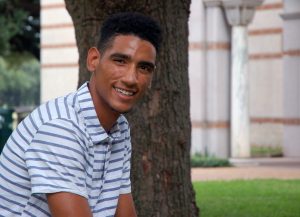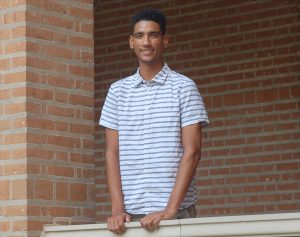“I guess I’ve always liked making and designing things,” said Rice University sophomore Travis Benedict.
“With computer science, you have so much control; you can code up a project and do something interesting in a long or short period of time. It’s like a condensed engineering process; in other engineering fields, after you complete your design, you need to collect materials and implement the project but in CS, you just design it, code it, and build it.”
Benedict arrived at Rice from New Jersey intent on becoming an Electrical Engineering major. He signed up for COMP 140 to meet an EE requirement and found he enjoyed the material. He said, “I wanted to explore the next progression so I signed up for COMP 182, not just as a requirement for EE, but because I enjoyed the work. Also, CS majors have good job prospects.”
He was surprised to discover Rice’s introductory CS courses focused on solving problems with real life applications. “We used Markov models to make stock predictions and I realized the freshmen could build a reasonably accurate model for stocks. The last project I worked on my freshman year was a hidden Markov model for speech tagging. We could write programs to look at a sentence, tag the parts of speech and predict if the next word would be a verb, noun or other parts of speech. It helped us improve our understanding of both linguistics and machine learning, and we were learning this as freshmen.”
In his second semester at Rice, Benedict received an email from his COMP 182 instructor, Luay Nakhleh, inviting him to apply for a summer research position. Benedict said, “Luay sent the class an email saying he was looking for researchers, especially undergraduates, to work on data science projects. I had no idea what CS research or data science projects even meant and this seemed like a good way to find out.”
Two of his friends from COMP 182 were also accepted into the summer research program. Chabrielle (Chab) Allen, Peter Dulworth, and Benedict were joined by 12 other Rice undergraduates for a pitch day, where they listened to graduate students and faculty present their proposals. “After hearing about 10-15 projects, the three of us agreed we wanted to work together. CS Ph.D. student Leo Elworth wanted two or three students for his genome visualization project. It seemed the most interesting, and we understood the type of work involved because we’d done it in COMP 182. All of us ranked Leo’s project as our number one choice and were assigned to his team. We were good friends already and we had a chance to work together all summer.”
The project was different than what Benedict thought it would be “I thought we’d just come in and do work, but we were really productive and
interested. We were motivated to have something to show at the end of the summer.”
The tool they developed allowed them to create evolutionary trees at specific points along the DNA. Benedict said, “It allows researchers to draw certain conclusions about the species within the tree or identify points for further study. It was a relaxed environment that allowed me to work with my friends and produce something tangible. Hopefully, it will be used by computational biologists studying DNA looking at how similar species have hybridized, and see how different parts of the DNA can be derived from different species.”
When asked how this summer study would affect his future endeavors, Benedict said “having [the research] published would be a great thing to have on my resume, but it is also a good experience to say I’ve worked on a software tool collaborating with people – a skill that is useful for CS and software engineers.”
Benedict and his teammates had weekly or bi-weekly meetings with either Elworth or Nakhleh –or both– to check on their progress. He said, “When we first met with Leo, he gave us a list of things he wanted the tool to do and we identified the things we wanted to work on most. We worked on our own things and then put them together, constantly using GitHub to make sure our code was working.”
Benedict advises students interested in CS to “just try it out! CS is nothing I ever considered but the courses were interesting. Follow your passion if you are enjoying something, and just stick with it. It was definitely a struggle, but the reward is worth it. One of the difficulties is the frustration of getting your program to work, but when you finally get it to work, it’s a great feeling.”
Travis Benedict matriculated in Fall 2016.


